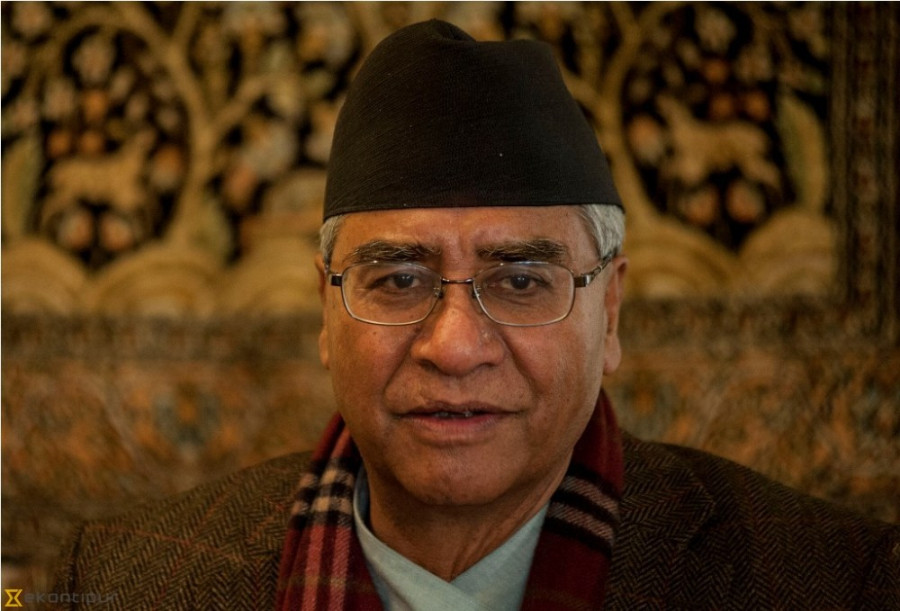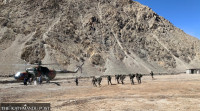National
Deuba faces ire in party over govt decisions
Prime Minister Sher Bahadur Deuba, who is under fire from the left alliance for a series of controversial decisions and political appointments, also faces a barrage of criticism within his own Nepali Congress party.
Kamal Dev Bhattarai
Prime Minister Sher Bahadur Deuba, who is under fire from the left alliance for a series of controversial decisions and political appointments, also faces a barrage of criticism within his own Nepali Congress party.
The Deuba government on Wednesday decided to revise the eligibility criterion for elderly allowance, lowering the age bar from 70 to 65. On Thursday, it declared 38 people killed in the Bandarmude blast during the insurgency as martyrs, prompting the Truth and Reconciliation Commission to remind the government not to encroach upon its jurisdiction.
The government has also made political appointments at Nepal Television, Gorkhapatra Sansthan, the Rastriya Samachar Samiti, Film Development Board, the Dairy Development Board and the Nepal Family Planning Association. However, it has apparently backtracked on its plan to remove the 30-year service period in Nepal Police after mounting opposition.
NC leaders said that the Deuba government, which has already become a caretaker, is not mandated to take decisions that have lasting implications. According to them, the party leadership, Cabinet members in particular, has not held discussions within the NC before taking important decisions such as those concerning the elderly allowance which cost the government dear.
NC leaders said that the party, which has traditionally been resisting populist programmes, has succumbed to the temptation this time, without fully realising financial implications of such moves. According to Finance Ministry officials, with the revision in the elderly age criterion, the government will have to fork out an additional Rs15.3 billion annually.
NC Central Working Committee member Shekhar Koirala said there had been no consultations in the party about the NC-led government’s decisions. “There is no connection between the government’s decisions and the party [policy]. The party cannot justify flawed decisions taken by the government,” Koirala said, adding that the government’s decision on elderly allowance could lead to an economic crisis in the country.
“Instead of lowering the age bar, we can build elderly care homes in all the districts and medical facilities for senior citizens,” Koirala suggested. NC leaders are planning to raise the issue in the party’s CWC meeting, which will take place after the National Assembly elections. They are of the view that the party cannot justify the government’s latest moves as the party has always opposed a distributive budget.
“The decisions taken in the absence of parliament have long-term implications. After the elections, the government is not mandated to decide on long-term policy matters,” said Nepali Congress Central Working Committee member Gagan Thapa.
“For the next five years, the NC will have to fight the left government on the basis of rule of law and moral ground. Such decisions will weaken our moral ground to protest wrong decisions of the left government in future,” said Thapa.
Thapa, however, said that the CPN-UML does not have any ground to criticise the government. “The UML’s major election plank was increasing the allowances for senior citizens. We don’t care what the UML says but the point is that the NC must be cautious to retain its democratic credentials,” he argued.
Political Analyst Puranjan Acharya, who is close to the NC, said the government’s decisions in recent days have dismayed party leaders and cadres. “The decisions taken by the government have tarnished the party’s image. After such decisions, the NC has lost its moral ground to criticise the leftist parties’ fiscal policy as populist and distributive,” said Acharya. “The government itself has given a message that the left alliance [of the UML and the CPN (Maoist Centre)] is free to come up with populist decisions,” he argued.
Defence Minister Bhimsen Das Pradhan, however, defended the decisions, arguing that the government would not be a caretaker until the National Assembly is elected. “So we are mandated to take policy-related decisions,” he said.




 23.38°C Kathmandu
23.38°C Kathmandu















